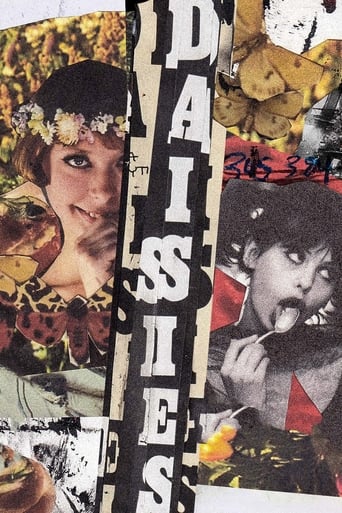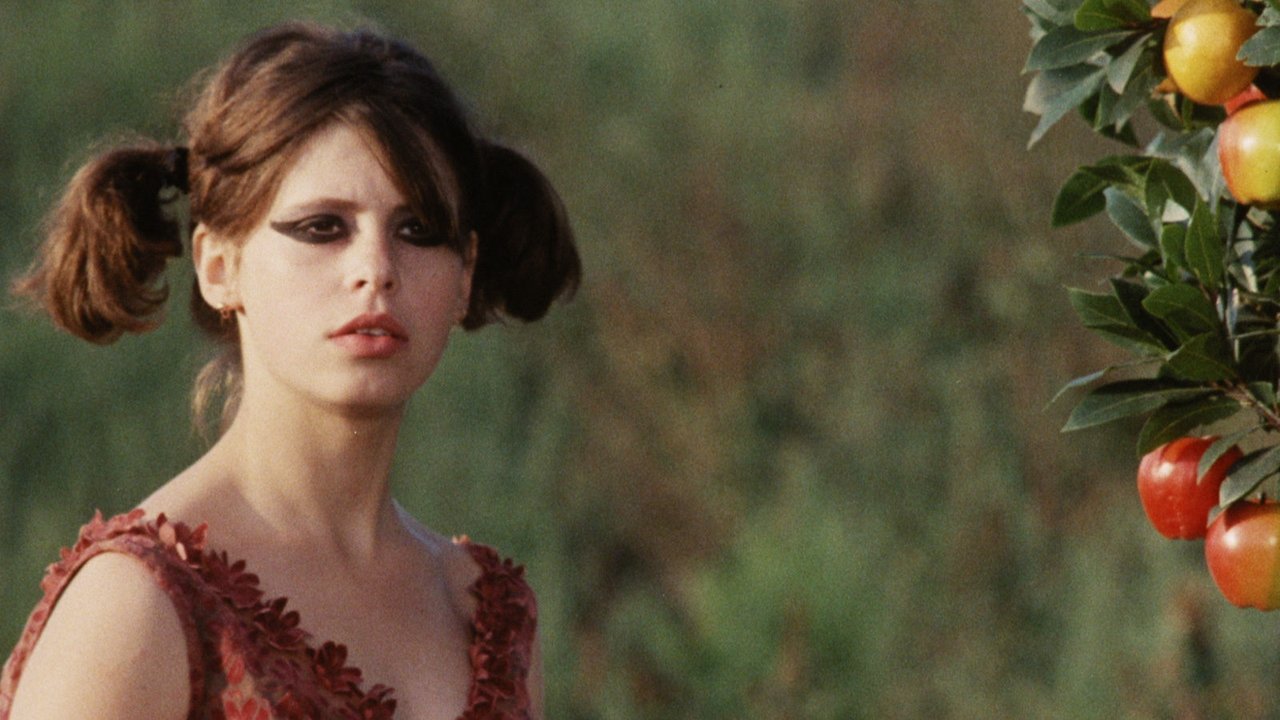lasttimeisaw
An avant-garde think piece from the late Mrs. Vera Chytilová (1929-2014), a spearhead figure emerges from Czech New Wave in the 60s, and keeps working consistently and domestically until her late age, DAISIES is her second feature with an economic length of 76 minutes, perhaps still remains as her most well-known work in her filmography.A whimsical, outlandish and provocative escapade about two young girls, both named Marie, Marie I (Cerhová), is a black-haired, Bardot-ish seducer and Maire II (Karbanová) is a blonde gamine, devilishly chic. Introduced by a robotic conversation between them, they decide to conduct a decadent lifestyle since the world has sunk to corruption and debauchery.Under Chytilová's unorthodox enforcement of cinematic tricks, the shots are immensely hyperactive, montages-laden with unexpected color-variations, fluidity and image-composition, and the two girls' follies become ever-enchanting, as audience's attention jumps from one scenario to another, they indulge in fine food and let some wealthy man-about-towns pay the bill, then swindle them to board the train on the pretence of going away with them before backtracking in the last minute (it works both ways, they leave with the train while the patron unfortunately misses the train). Occasionally, they snitch money and disturb a pas de deux in a club, revel in their own frolic bravado before being dragging out by the guard.When they are alone in their apartment, food and playfulness continues to running rampant, young suitors' romantic courtships cannot compete with a luxurious milk bath garnished with some raw eggs. A fantastic sleight of hand stuns when they shear each other to smithereens then the fragments being re-arranged into a knowingly comical presence like a misplaced puzzle. Their insatiable gluttony will reach the zenith in the sumptuous episode, where they single-handedly wreak havoc on a lavish banquet, an unapologetic manifesto to ram home epicurism to its dumbfounded spectators.In the coda, the two girls are granted a second chance to redeem their wanton acts, but Chytilová will not risk anything to foil her mischievously nonconformist endeavour. In one word, DAISIES' enduring allure lies in its radical Dadaism style and Chytilová's full liberation of her whimsy and artisan-ship. A fine piece of art can evince a wonderful change from the offerings of cinema's conventional product line, as it manifests in the end, the film is dedicated to those whose spiritual life has descended into completely chaos.
Perception_de_Ambiguity
A peerless, cinematic celebration of the powerlessness of the individual, which the film shows to be both a good and a bad thing; no matter how much havoc the two girls-who-just-wanna-have-fun cause, or how much they exploit the work of other people, they are never a serious danger to society, instead their irresponsible lifestyle really only endangers their own lives, not that the through and through nihilistic 'Daisies' says that the alternative of being "good" would be any more rewarding in the end, which again stresses the meaninglessness of life.Towards the beginning in the club there is an interesting juxtaposition between a man and woman performing the wild and silly Charleston(?) dance while the Maries are putting on their own wild show and apparently seem to draw all the attention away from the performers and to themselves. The former two get paid for their performance and are considered entertainment while guests doing the same are considered a nuisance or even a threat so the Maries are thrown out of the club. I guess this also reflects the viewer's relationship with the film and its protagonists, it's fun for us to watch this controlled chaos from a safe distance and knowing that its just a show, but if those same girls would be random people invading our lives behaving like this we'd probably find it anything but fun.
Ivona Poyntz
Perhaps because Vera Chytilova directed 'Daisies' in 1966, at the start of the Prague Spring, that subsequent viewers scramble in a mad rush to label the film as a feminist outcry against the patriarchal hegemony organised along communist themes of repressive theocracy.Even without any prior knowledge of the historical context in which this film emanated, it works as a playful collage of surrealistic scenes which serve as an ironic lambast and a helping of satirical lashing against the entrenched consumerism and conventional normative of the day: a mad, bad, coming of age story embodying two young girls who decide that if the world is 'so bad', then they will be too. How exactly is the world so bad, then? There is one very oblique reference to war in the very beginning of the film, but in general the themes which are propelled to the forefront and unpicked with gentle satire (well, and slapstick comedy, and cartoon animations, and lackadaisical fun-o-rama) focus on nihilism, hedonism, decay of moral values, ennui and lack of any productive and meaningful life goals. Rebelling against all this is perhaps the true definition of a 'rebel without a cause', and perhaps there is never any 'age' when disenchanted incumbents won't have a go at the moral depravity of their peers, as each generation discovers anew the hypocrisy and disinterment between society paying lip service to social values and the underlying reality which ensconces the exact opposite.So, Marie and Marie (our two protagonists), are going to be 'bad'. But, not too bad: this isn't going to be the Czech version of 'a Clockwork Orange' by any means. Bad here means taking unscrupulous old men for a ride: wizened insufferables who hope to score based on paying for a meal. Well, if eating their food and sending them on their way makes the two Maries bad, what in heavens name would they have done if they were 'good': succumbed to the wily charms of the octogenarians? Uugh, it doesn't bear thinking.Being bad is defined twice more in the film: once as the girls get tipsy in a cabaret and stage an impromptu side show in their cubicle as they start jiving: (quelle horreur!) and once more at the finale when they descend upon a baquet hall and proceed to systematically destroy the food plateau, the room's fixtures and furnishing as well as the banqueting table and all the accoutrements on it. All this is done so playfully, gracefully, and sweetly that the viewers get swept up in the ride: we're not indignant at the wanton destruction as these two scamps wallop, we're enchanted: not least by the food fight and strip tease which culminate the scene.But what happens next, the true denouement and final scene of the film, is an ironic take of double entendre which demands kudos. The two Maries decide they are going to try and make amends having wreaked havoc with the food hall. Why they decide this, remains unclear: is it because polit bureau apparatchiks are whispering sweet somethings in Chytilova's ear? Is it because she wants one final stab at bohemian assertion? In any event, the two Maries are going to make good: they tell us so: 'We shall be happy because we are good' they say. But in a tonal chorus set to a grating repetitive basso continuo which leaves the audience in no doubt that they mean the opposite. Dressed in newspaper rags (which would probably have Lady Gaga enthralled if she had seen it BEFORE the meat dress), they trip around setting the banquet to rights. But just like Humpty Dumpty, they are never going to be able to put this together again. 'Does it matter?' asks Marie number 1. 'No it doesn't matter' says Marie number two, and I can't help cheering them on.
ucsfcc
This movie is a trip! Daisies was created in an avant-garde era in which artist were experimenting with abstract music, painting, photography, etc. Furthermore, this movie depicts a feminists perception of the world, specifically men. The first time I watched this film I walked out because it was too far out there for me. But watching it again two years later with a friend and analyzing it made the film much more enjoyable. There are subtle scenes in the film that give the viewer a glimpse of what the director was trying to get through to the audience. For instance, about half-way through the film the main actresses, Marie I and Marie II, begin to chop-up various foods shaped as male genitalia and proceed to eat them. Furthermore, Marie I receives a phone call from a male "companion" in which the traditional male-to-female roles are reversed. In order to get the most out of this movie, try and ask yourself the bigger question..."What is the director trying to tell me?" Rather than, "What the hell is going on?" All-in-all...good film and I highly recommend it.


 AD
AD



